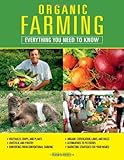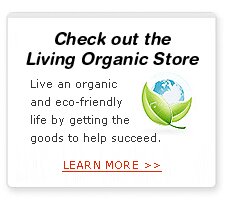Living Organic Online Store
The Organic Gardener's Handbook
In a handy, illustrated format, this reference book studies all aspects of organic farming, from the basics of climate, geology, and soils, to an explanation of plants and their orders. The guide also explores planning and planting methods, including strip cropping and crop rotation; protection for a variety of vegetables and edible plants; companion planting and biological control; plant pests, barriers, and deterrents; and weed management. Particular attention is paid to improvements to the soil, fertilizers, minerals, compost, and manures. Complete with a list of tasks and monthly reminders, an extensive glossary, and useful contacts, this resource provides reputable advice for all gardening aficionados.
Related Products
The Complete Guide to Organic Livestock Farming: Everything You Need to Know about Natural Farming on a Small Scale
Small scale farming has grown greatly in popularity during the last two decades, with a greater turn in public awareness toward locally grown, organic, grass fed products that have not been modified, chemically altered, or poorly fed. For that reason, those looking to start a small scale farm and raise livestock have a greater chance than ever before to take advantage of the new market for small scale goods. This book will show any potential small scale farmer how to start raising their livestock and marketing it to the organic, natural lifestyle community that so fervently seeks out these products. You will learn how to start the basic outline for your new small farm, including which livestock to raise, how to build their pens and habitat, and what you will be feeding them to maintain a healthy, organic farm. You will learn the basics of animal husbandry, from genetics and breeding to feeding, building locations, and proper health and reproduction care. You will learn how to find yourself in the right niche for selling your products and what legalities you must see to as well as the butchering and processing phase Hundreds of hours of in-depth interviews have been conducted for this book with top experts in farm management to provide you with details about farm planning, financial planning, and proper livestock planning. A complete appendix will detail the various breeds and needs of cattle, chickens, goats, horses, pigs, and sheep to help you select the right livestock for your farm. In addition, you will learn the basic composition of most feeds, different grasses and legumes you can use, and find a plethora of outside resources to utilize. For anyone with dreams of a small farm and raising livestock in their future, this is a book for you.
Dirt: The Erosion of Civilizations
Dirt, soil, call it what you want--it's everywhere we go. It is the root of our existence, supporting our feet, our farms, our cities. This fascinating yet disquieting book finds, however, that we are running out of dirt, and it's no laughing matter. An engaging natural and cultural history of soil that sweeps from ancient civilizations to modern times, "Dirt: The Erosion of Civilizations "explores the compelling idea that we are--and have long been--using up Earth's soil. Once bare of protective vegetation and exposed to wind and rain, cultivated soils erode bit by bit, slowly enough to be ignored in a single lifetime but fast enough over centuries to limit the lifespan of civilizations. A rich mix of history, archaeology and geology, "Dirt "traces the role of soil use and abuse in the history of Mesopotamia, Ancient Greece, the Roman Empire, China, European colonialism, Central America, and the American push westward. We see how soil has shaped us and we have shaped soil--as society after society has risen, prospered, and plowed through a natural endowment of fertile dirt. David R. Montgomery sees in the recent rise of organic and no-till farming the hope for a new agricultural revolution that might help us avoid the fate of previous civilizations.
Organic Farming: Everything You Need to Know
Going organic may be a clear way of getting back to basics—and getting away from the havoc chemicals can wreak on our health and our environment—but the basics themselves may not be so clear. How to begin? What kind of fertilizer and feed are allowed? Is there natural pest management? What does certification entail? And is this the way to go? This book covers the basics and then some. Whether you’re thinking of starting an organic farm or making the transition to organics, whether you’re growing crops or raising animals, you’ll find everything you need to know in these pages—from getting started to developing a marketing strategy. A list of resources also points the way to other books, websites, and organizations focusing on every aspect of organic farming, including state standards and more information.




